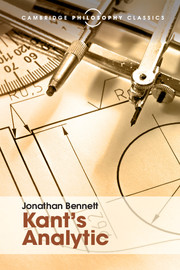Book contents
11 - Causal necessity
from Analytic of principles
Published online by Cambridge University Press: 05 July 2016
Summary
Kant and Hume on causality
Over the concept of cause, Kant is no Humean. Empiricist analyses must fail, he says, because ‘the concept of a cause involves the character of necessity, which no experience can yield’. Yet he describes the schema of the concept of cause thus:
The schema of cause…is the real upon which, whenever posited, something else always follows. It consists, therefore, in the succession of the manifold, in so far as that succession is subject to a rule.
This sounds like Hume's view that causal connection is a logical construction out of temporal succession and regularity. Perhaps, however, Kant takes obedience to a ‘rule’ to involve necessity as well as regularity. Or perhaps he thinks that the schema of cause—which is the category in its empirically usable form—need not involve the necessity which is involved in the category; for he agrees that this necessity is one ‘which no experience can yield’ and which is therefore, presumably, irrelevant to the details of how the concept of cause is empirically used. Kant's position is described by Körner thus:
While Kant insists that the notion of causality is not equivalent to that of regular succession, he holds that unless it implied this notion it could not refer to anything in perception,
and, we might add, he ought to hold that this implication is all we need for deciding what is causally connected with what.
Let us leave the schema. I want to know why Kant thinks there is necessity in the category—why he thinks that causal sequences are necessary as well as regular and that Hume must therefore have missed something.
One of his points against Hume is clearly valid. We do say things like ‘The dam was bound to collapse’, ‘The water must boil soon’, ‘The passion-fruit cannot flourish in this climate’. Hume explains this sort of necessitarian talk as a projection onto the world of our own intellectual compulsions. Having seen many Fs followed by Gs and none not so followed, we find that when confronted by a new F we cannot help expecting a G; but, because ‘the mind has a great propensity to spread itself on objects’, we say ‘A G has to follow’ instead of ‘I have to expect a G’.
- Type
- Chapter
- Information
- Kant's Analytic , pp. 162 - 173Publisher: Cambridge University PressPrint publication year: 2016



